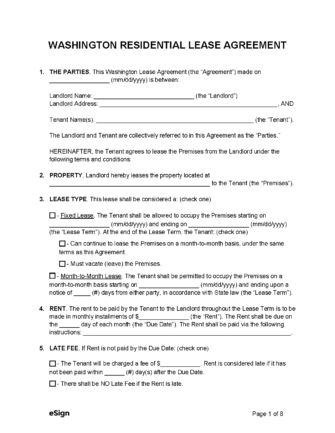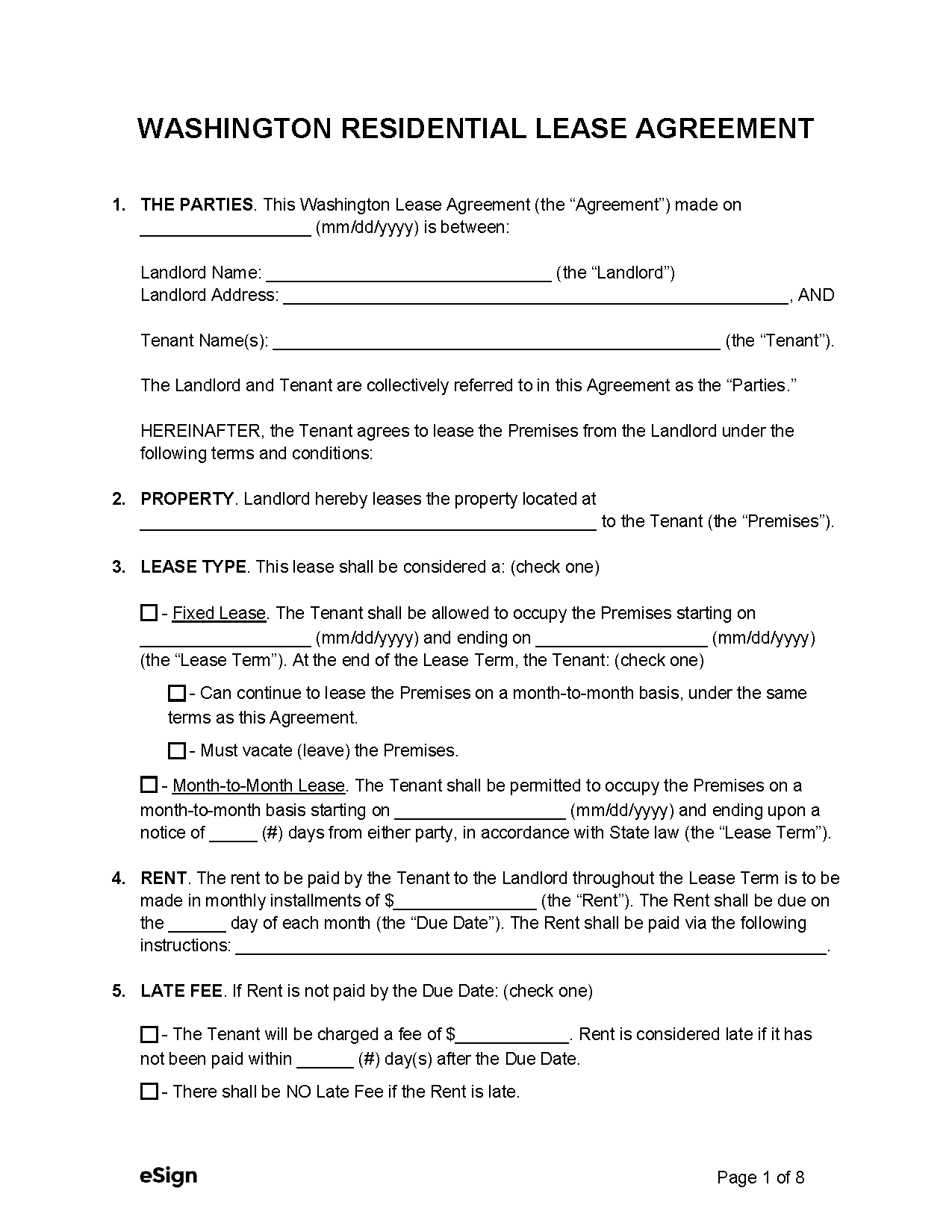
A Washington lease agreement is a written rental arrangement between a tenant and a landlord of residential or commercial real estate. Most residential leases will be fixed-term contracts that cannot be modified until the expiration of the rental term. For flexible rental arrangements, the landlord can create a month-to-month lease that can be ended anytime with sufficient notice.
A Washington lease agreement is a written rental arrangement between a tenant and a landlord of residential or commercial real estate. Most residential leases will be fixed-term contracts that cannot be modified until the expiration of the rental term. For flexible rental arrangements, the landlord can create a month-to-month lease that can be ended anytime with sufficient notice.
PDF Download
A Washington lease agreement is a written rental arrangement between a tenant and a landlord of residential or commercial real estate. Most residential leases will be fixed-term contracts that cannot be modified until the expiration of the rental term. For flexible rental arrangements, the landlord can create a month-to-month lease that can be ended anytime with sufficient notice.
4.4 | 14 Ratings Downloads: 3,414
Rental Application – Completed by lease applicants to submit their personal information to landlords and authorize a background check.
Maximum Amount ($) – State law does not put a restriction on the maximum security deposit amount that landlords can collect from tenant. The city of Seattle limits security deposits (plus any nonrefundable fees) to a maximum of one month’s rent. [7]
Collecting Interest – The landlord is entitled to any interest earned from the deposit unless otherwise agreed upon in writing. [8]
Returning to Tenant – Security deposits must be returned within 30 days after the lease ended or the tenant abandoned the property. [9]
Itemized List Required? – Yes, a statement of the reasons for keeping a portion of the tenant’s security deposit for damages must be provided along with copies of bills, invoices, or receipts for repairs. [10]
Separate Bank Account? – Yes, security deposits must be held in a trust account that is maintained by the landlord for the sole purpose of holding security deposits. [11]
General Access – The landlord may access a rental property by giving the tenant two days’ written notice. [12]
Immediate Access – The landlord may enter without notice in the case of an emergency or abandonment. [13]
Grace Period – Late fees cannot be charged until five days after rent is late. [14]
Maximum Late Fee ($) – Maximum fees for late rent payments are not mentioned in state statutes.
Bad Check (NSF) Fee – Landlords may charge a tenant a reasonable fee for a bounced rent check. If payment is not made within 15 days, they may charge $40 plus 12% interest on the rent check. [15]
Withholding Rent – If a landlord fails to make repairs after being notified, the tenant’s options are to terminate the lease, file a legal action with the court, or repair the issues and deduct the cost from rent (without exceeding two months’ rent). [16]
Non-Payment of Rent – Landlords must use a 14-day notice to quit if a tenant fails to pay rent on the agreed-upon due date. [17]
Non-Compliance – If a tenant fails to comply with the lease agreement, landlords can deliver a 10-day notice to comply or quit. [18]
Lockouts – Tenants cannot be prohibited from accessing the property without the landlord obtaining a court order. [19]
Leaving Before the End Date – If a tenant abandons the rental property, the landlord can charge them the total rent amount for the remainder of the lease term or the accumulated rent between the date of abandonment and re-renting the property, whichever is less. [20]
Month-to-Month – To terminate a monthly lease agreement, landlords must provide tenants with a 20-day notice to quit. [21]
Unclaimed Property – If a tenant leaves personal property after abandoning the rental unit, the landlord must store their belongings and notify them that they will be sold unless claimed within 45 days of the notice. [22]